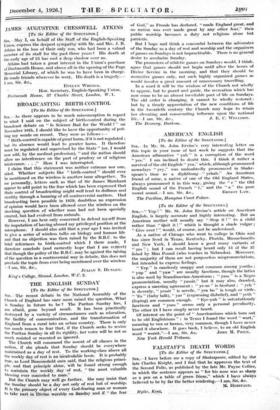THE ENGLISH SUNDAY
[To the Editor of the SPECTATOR.] SIR,—The recent 'debate in the National Assembly of the Church of England has once' more 'raised the question, What is Sunday in future to be ? The Puritan Sunday has, I am afraid, gone beyond recall. It has been practically destroyed by a variety of circumstances such as education, the facility of communication, and the transformation of England from a rural into an urban country. There is only too much reason to fear that, if the Church seeks to revive the Puritan Sunday in all its rigidity, her voice will be not so much resisted or resented as ignored.
The Church will command the assent of all classes in the nation, if she pleads that Sunday should be everywhere maintained as a day of rest. To the working-class above all the weekly day of rest is an incalculable boon. It is probably true, as Lord Beaconsfield once said, that the religious princi- ple, and that principle alcine, Will be found strong enough to maintain the weekly day 'of rest, " the most valuable blessing ever conceded to But the Church may well go further. She may insist that the Sunday should be a day not only of rest but of worship. It is the primary object of every God-fearing man or woman to take Dart in Divine worship on Sunday, and if " the fear
of God," as Froude has declared, " made England great, and no nation was ever made great by any other fear," then public worship becomes a duty , not religious alone but patriotic.
But I hope and think a concordat between the advocates of the Sunday: as a day of rest and worship and the Organizers of games on Sundays is not impracticable. There is fingeneral desire to seculariie Sunday.
The promoters of athletic gaMes on Sundays would, I think, agree that' games should • not begin until after' the hours 'of Divine Service in the morning, and that they should. be recreative games only, not such highly organized games as would involve a great amount of unnecessary travelling.
• In a word it will be the wiadoin of the Church not wholly to oppose, but to guard and guide, the recreation which has now come to be an almost inevitable part of life on Sundays. The old order is changing, it cannot be wholly restored ; but by a timely appreciation of the new conditions of life- in the twentieth century the Church may hope to retain her elevating and consecrating influence upon the national






























































 Previous page
Previous page